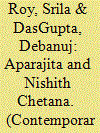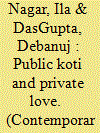| Srl | Item |
| 1 |
ID:
177936


|
|
|
|
|
| Summary/Abstract |
This article examines self-making projects and the desire for respectability within queer lives in Kolkata, across distinct class-caste affiliations. We argue the desire for queer respectability take virtual forms, sartorial fashioning, and yet remains a convoluted project mirroring Kolkata’s relationship with neoliberal capitalism. The authors engage with a young lesbian identified activist and a young male fashion designer whose sexual identity remains tacit. Their virtual and real interactions reveal how both the characters conceal their caste and class status through projects of sartorial fashion in order to be read as appropriately queer. The article argues for understanding sexual and gender identities in relation with class, and caste status, as well as ethnic and religious identities, thereby revealing how the liberatory potentials of queer activism is a form of emergent neoliberal governmentality within contemporary India.
|
|
|
|
|
|
|
|
|
|
|
|
|
|
|
|
| 2 |
ID:
143547


|
|
|
|
|
| Summary/Abstract |
In this paper, we juxtapose the present-day Supreme Court battles over the colonial anti-sodomy provisions in the Indian Penal Code (Section 377), with everyday interpretations of carnal intercourse by kotis and jananas in order to visibilize a whole different social world of carnality. The responses to the law coming from the civil society formations (namely the lesbian, gay, bisexual and transgender (LGBT) rights organizations, HIV/AIDS organizations and women's rights organizations) are the site for the formation of a modern Indian homosexual subject, one who claims her/his rights to love and privacy through the language of human rights and constitutional freedom. We argue that the arrival of the modern rights-bearing homosexual subject is contested by political and religious formations through discourses of sin, unnaturality and proper sexual conduct. The contestation of religious discourse through the discourse of constitutional rights covers over the creative interpretations of religion provided by kotis/jananas. An analysis of the kotis/janana discourse and bodily practices reveals sexual subject formation through the creative reinterpretation of notions such as sin and unnaturality. In conclusion, we contend that the creative interpretations of religious themes by kotis/jananas trouble nationalist religious discourses as well as the constitutional discourses of the LGBT rights movement.
|
|
|
|
|
|
|
|
|
|
|
|
|
|
|
|